Are bamboo skewers sustainable?
Worried your cookouts harm the environment? Choosing the right skewers feels impossible. Bamboo offers a surprisingly sustainable option1 for your grilling needs, but are they truly the best choice?
Yes, bamboo skewers are highly sustainable. Bamboo is a fast-growing grass that requires no pesticides or fertilizers and regenerates from its own roots. This makes it a much more renewable resource2 compared to wood or plastic, offering a great eco-friendly3 choice for many uses.
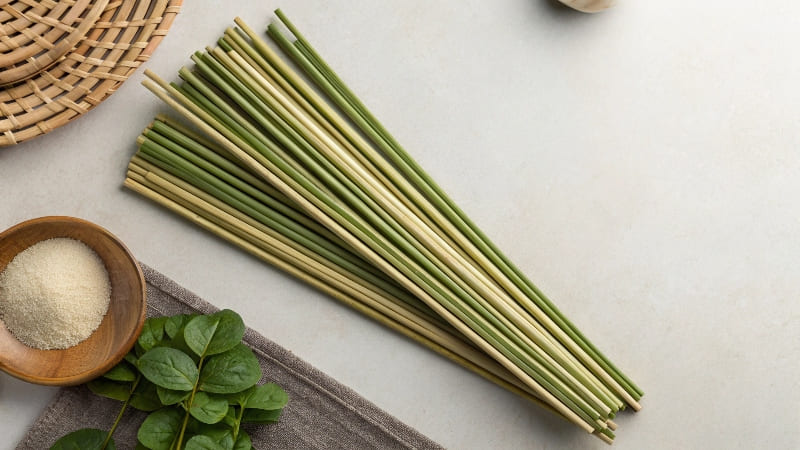
As a sourcing agent in Yiwu for many years, I've watched products evolve. My clients, like Adam, an experienced importer from Sri Lanka, always ask about the true environmental cost4 of the products they buy. He needs to give his customers clear answers. The sustainability of bamboo is a frequent topic. It's not a simple yes or no answer that satisfies a smart buyer. To truly understand, we need to break down the details. Let's look closer at what makes bamboo a popular choice and answer the most common questions I get.
Are bamboo sticks eco-friendly3?
Heard the term "eco-friendly3" but don't know what it means for skewers? You might be using products with a hidden environmental cost4. Let's check bamboo's full lifecycle to be sure.
Yes, bamboo sticks are very eco-friendly3. Their cultivation benefits the environment by preventing soil erosion5 and releasing more oxygen than trees. And since they are a natural material, their production process6 is generally cleaner than that for plastic or metal alternatives, making them a solid green choice.
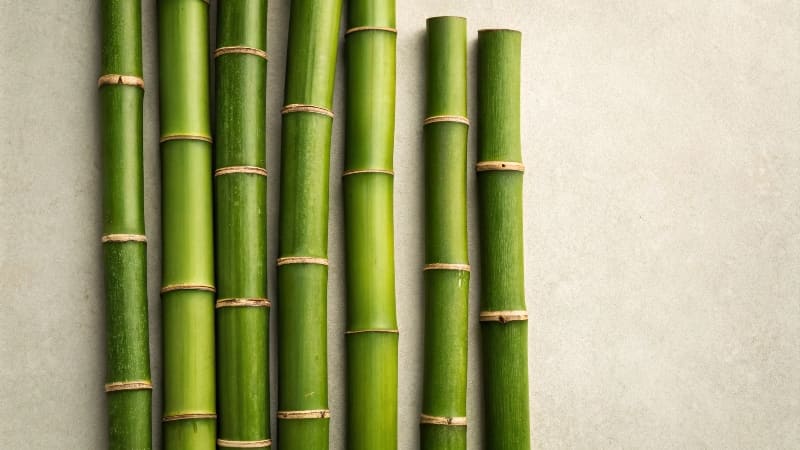
When I visit suppliers here in China, the difference between a bamboo farm and other material production sites is clear. Bamboo is a remarkable plant with an impressive green profile that goes beyond just being a plant.
Bamboo's Growth Cycle
Bamboo is technically a type of grass, not a tree. This is a very important distinction. Some species can grow several feet in a single day and are ready for harvest in just 3-5 years. Compare that to hardwood trees7, which can take decades. When bamboo is harvested, the root system remains intact and sends up new shoots. This means it doesn't require replanting, and it prevents soil erosion5. It also needs very little water and no pesticides to thrive, which is great for the local ecosystem8.
Environmental Comparison
I help my clients understand these points so they can market their products effectively. The story of bamboo is powerful when compared to alternatives.
| Feature | Bamboo | Wood (Hardwood) | Plastic |
|---|---|---|---|
| Growth Rate | 3-5 years | 20-50+ years | N/A (Fossil Fuels) |
| Pesticides | Not needed | Often used | N/A |
| Resource Use | Low water, self-regenerates | High, deforestation risk | High, non-renewable |
| Oxygen Output | High | Moderate | None |
This makes bamboo a clear winner in the raw material stage.
Are bamboo skewers biodegradable9?
The party's over, but the used skewers remain. Throwing them in the trash feels wasteful and adds to landfills. Luckily, bamboo's natural properties offer a much better solution.
Yes, bamboo skewers are 100% biodegradable9. As a natural plant material, they will break down and return to the soil over time. Under the right composting10 conditions, they can decompose in just a few months, unlike plastic which takes centuries to degrade.
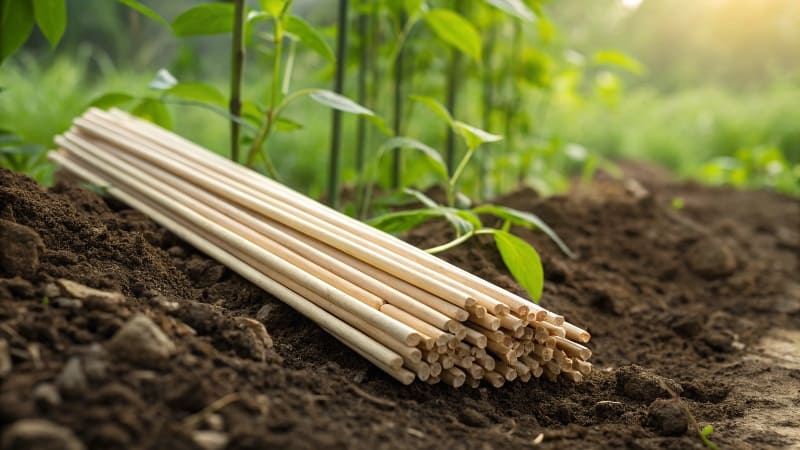
"What do we tell customers about disposal?" This is a question Adam asked me recently when placing a large order for a supermarket chain in Sri Lanka. The end-of-life of a product is now a huge selling point.
What "Biodegradable" Really Means
Being biodegradable9 means that microorganisms like bacteria and fungi can break the material down into natural elements like water, carbon dioxide, and organic matter. Because bamboo skewers are just processed plant material, they decompose naturally. This is a huge contrast to plastic skewers, which break down into harmful microplastics that pollute our soil and water for hundreds of years. Metal skewers don't biodegrade at all.
Composting Bamboo Skewers
The best way to dispose of used bamboo skewers is to compost them. In a home compost bin, they will break down and enrich the soil. I always suggest breaking them into smaller pieces to speed up the process. Even if they end up in a landfill, they will still biodegrade much faster than any plastic alternative. You can even use them as small stakes to support garden plants before you compost them. This natural cycle is a simple but powerful story for consumers.
Are bamboo skewers recyclable11?
You want to recycle correctly, but you're unsure about bamboo skewers. Putting the wrong thing in the bin can cause big problems for recycling centers. Let's find out where they belong.
No, bamboo skewers are generally not recyclable11 through standard municipal programs. They are organic material, often contaminated with food waste12, which makes them unsuitable for paper or plastic recycling streams. The best disposal method is composting10, not recycling.
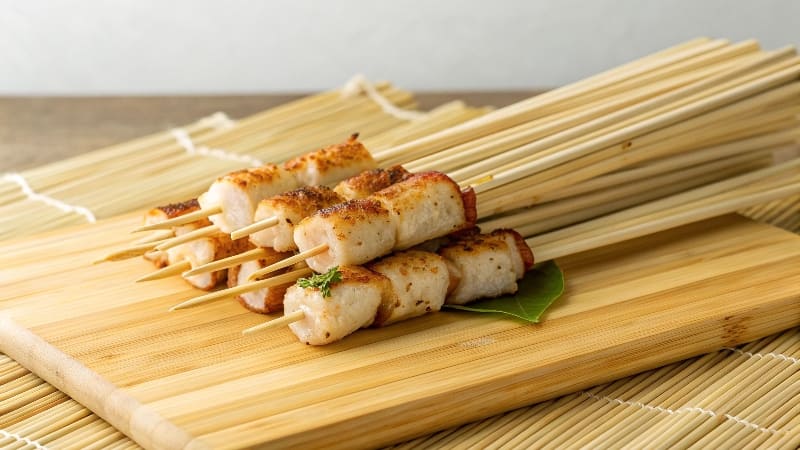
I always stress the importance of clear communication to my clients. Confusing "biodegradable9" with "recyclable11" can mislead customers and create waste problems. It's my job to provide the correct information so they can label their products accurately.
Why Recycling Centers Say No
Recycling facilities are designed to sort specific materials like paper, glass, plastic, and metal. Bamboo is an organic material, not paper. When it gets mixed in with paper recycling, it's treated as a contaminant. Also, skewers are usually covered in grease, sauce, and food bits. This food contamination can ruin an entire batch of otherwise clean recyclable11s. For these reasons, they are always filtered out and sent to the landfill from a recycling facility.
Recycling vs. Composting
It's helpful to see the difference clearly. I often create simple tables like this for my clients to help them educate their sales teams and customers.
| Process | What It Is | Suitable For | Not Suitable For |
|---|---|---|---|
| Recycling | Re-processing old materials into new products | Paper, plastic, metal, glass | Food waste, organic matter |
| Composting | Natural decomposition of organic matter into soil | Food scraps, yard waste, bamboo | Plastic, metal, glass |
This simple distinction helps everyone make better decisions. The correct path for bamboo is composting10 or simple yard waste disposal, never the recycling bin.
Are bamboo skewers better than metal?
Deciding between bamboo and metal skewers is tough. Metal is reusable, but is the hassle of cleaning and its production impact worth it? Let's directly compare them.
Whether bamboo is "better" than metal depends on your needs. Bamboo is better for convenience, large gatherings, and has a lower initial environmental impact. Metal is better for long-term reusability and cost-effectiveness over many years, despite its higher production energy.
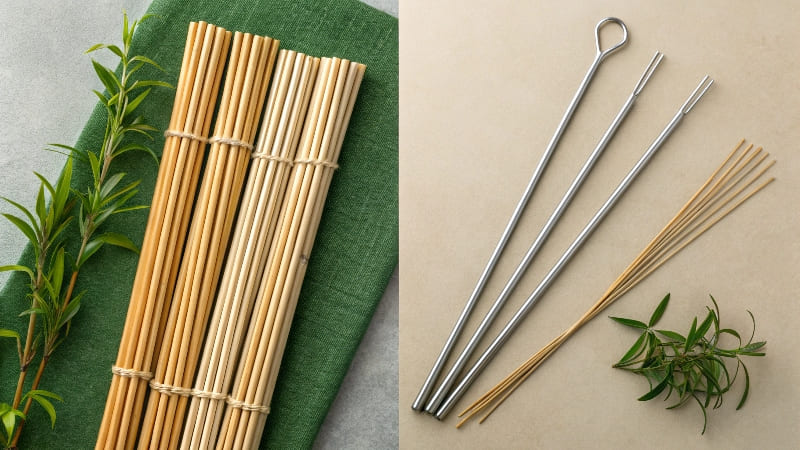
This is a practical question I discuss with all sorts of buyers. A family looking for tools for their home grill has different needs than a catering company that serves thousands of people. My client Adam, for instance, sources for both retail and food service in Sri Lanka, so we have to weigh the pros and cons for each use case.
Factors to Consider
The "better" choice really comes down to how you plan to use them. For a big party, outdoor event, or a restaurant, bamboo is often the more practical choice. The convenience of being disposable saves a huge amount of time on cleanup. For a home griller who makes kebabs every weekend, a set of high-quality metal skewers might be a better investment over the long term.
Head-to-Head Comparison
Let's break it down feature by feature. This is how I help my clients decide what to stock.
| Factor | Bamboo Skewers | Metal Skewers |
|---|---|---|
| Reusability | Single-use | Highly reusable |
| Upfront Cost | Very low | Higher |
| Environmental Impact (Production) | Low | High (mining, smelting) |
| Environmental Impact (Disposal) | Biodegradable | Reusable (low waste) |
| Convenience | High (no cleaning) | Low (requires washing) |
| Best For | Large parties, catering, convenience | Home use, repeated grilling |
Ultimately, there isn't one "best" answer, only the best fit for a specific situation. Both have a place in the market.
Conclusion
So, bamboo skewers are a sustainable, eco-friendly3, and biodegradable9 choice. While not recyclable11, they are a great alternative to plastic and a convenient option compared to metal for many situations.
Learn why bamboo is considered a sustainable choice for various products. ↩
Discover why bamboo is classified as a renewable resource. ↩
Understand the eco-friendly aspects of bamboo skewers and their benefits. ↩
Explore the environmental implications of using bamboo in products. ↩
Discover how bamboo cultivation helps in preventing soil erosion. ↩
Learn about the cleaner production process of bamboo compared to plastic. ↩
Compare the sustainability of bamboo with that of hardwood trees. ↩
Learn about the positive effects of bamboo on local ecosystems. ↩
Discover how bamboo skewers decompose and their impact on the environment. ↩
Find out the best practices for composting bamboo skewers and enriching soil. ↩
Learn why bamboo skewers are not recyclable and the best disposal methods. ↩
Understand the challenges of recycling bamboo skewers due to food waste. ↩